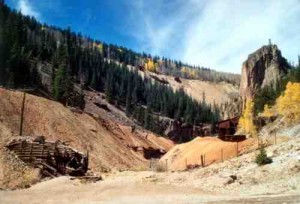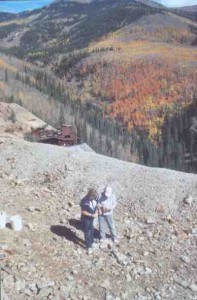Essay by John Krist
Recreation – July 2006 – Colorado Central Magazine
AS A RULE, it is not a good idea to smack a fellow river rafter with a paddle or to push him out of the boat in the middle of a rapid.
Not only do such actions constitute a breach of wilderness etiquette, they can cause hard feelings which might result in unpleasantness later in camp. And there’s also the possibility of drowning, which would no doubt lead to complications involving the authorities. But there were times during a recent trip down the Selway River in Idaho when I was tempted to bludgeon one of my fellow rafters.
The provocation? He was wearing a wristwatch. And it kept beeping — chiming out the hours as if he had an appointment to keep.
I had some appointments of my own. There were some ospreys atop a dead Douglas fir downstream that I planned to watch. I intended to rendezvous with several groves of western red cedars. There were some polished rocks on a gravel bar demanding my attention, some sandy beaches requiring inspection.
I did not, however, require a watch to keep my appointments. They would occur, or not, on a schedule determined by the current of the river and the movement of the sun and moon across the sky. On a wild river, in the middle of one of the largest wilderness areas in the Lower 48 states, a beeping wristwatch is about as useful as an anvil.
But it’s so hard to sever the technological tethers that bind us to the world we’ve built. They grow stronger and draw tighter with each passing year: cell phones, pagers, laptop computers with wireless modems, e-mail, Global Positioning Systems, instant messaging, 24-hour television news, satellite radio that floods even the great empty spaces of the West with an unceasing barrage of music, news, commentary and commercials.
It’s possible to be too much in touch. The more we talk, the less we listen. The more chatter we hear, the less we think. The more we obsess about where we need to be and what we need to do in the next hour, the next t day, the next week, the less time we spend in the here and now.
Now, for me, had become floating down a river. The Selway rises among the snow-covered peaks of the Bitterroot Mountains in north-central Idaho. The Bitterroots are a rugged part of the Northern Rockies, and the Selway flows through the heart of a whopping big chunk of federally designated wilderness draped across the spine of the continent. There are no roads in most of the area, and aside from a handful of remote airstrips, the only way into its forested heart is on foot, on horseback, or by boat.
These were the travel options of a not-so-distant past: walk, ride, float. If you are willing to behave according to the landscape’s terms, a journey in to such a place can be as a much a journey through time as through space.
As time-travel options go, you cannot do better than the Selway. Clear as crystal and nearly as cold as ice, it begins life as a small but rambunctious stream, becoming powerful and swift as it gathers the contributions of tributary creeks. Where the gray cliffs crowd together, rapids alternate with deep emerald pools. Where the canyon walls step back from the river, allowing it to spread out, the water grows shallow and slides transparently across colorful, polished cobbles that are as intricately patterned as a mosaic assembled by a master artist.
YOU can give yourself over to this place. Leave the laptop at home, stuff the cell phone into the glove compartment, pitch the computerized notebook into the nearest trash receptacle. Wear the wristwatch at first, if it makes you uncomfortable to be without it. But turn off the alarm.
On the first day, your head will still be ringing with the din of modern life. Gradually, though, silence seeps into your pores. Time slows to the river’s pace. And you’ll talk only to people with whom you can make eye contact. For entertainment, you’ll trade animated pixels for the interplay of sunlight and shadows in dense forest, the passing parade of wildflowers and birds, and rushing headlong through walls of water. Your mind will clear and your spirit will grow calm.
Eventually, you might even take off that wristwatch.
John Krist is a contributor to Writers on the Range, a service of High Country News. He is a columnist for the Ventura Star in California.


